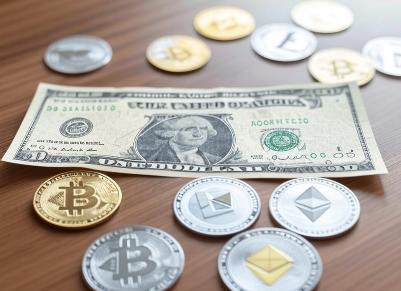
The digital revolution in payments is here, and it’s a game changer—yet one that threatens to shake the very foundation of the global financial system. Cryptocurrencies like Bitcoin aren’t just alternative investments or speculative assets; they’re challenging the dominance of traditional financial networks like SWIFT and, ultimately, the U.S. dollar itself.
If you’ve been following the rise of cryptocurrencies, you’ll know that they’re more than just a new way to invest. They offer something more dangerous—an alternative means of transferring payments across borders without relying on the SWIFT network, which has been the backbone of global trade for decades. This bypassing of traditional banking systems allows countries and individuals to evade sanctions, sidestep traditional financial gateways, and—here’s the kicker—undermine the global supremacy of the U.S. dollar.
In this light, cryptocurrencies could be an even bigger threat to the U.S. than the BRICS currency coalition, which has garnered much attention in recent years. A BRICS-backed currency could weaken the dollar, but it still operates within the global banking system. Cryptos, however, exist outside this system entirely, allowing nations like Russia, Iran, and potentially even China, to conduct international trade without the U.S. getting a say. In essence, Bitcoin and its crypto peers allow countries to skirt around the dollar and SWIFT without ever converting to or using traditional currencies.
Take, for example, the ongoing conflict between the U.S., Ukraine, and Russia. With Russia cut off from SWIFT and heavily sanctioned by the West, it has been forced to find alternatives. Cryptocurrencies, especially Bitcoin, have become a critical lifeline. They provide a way to bypass the traditional U.S. dollar-based system and continue conducting business internationally without the U.S. being able to freeze their assets or block their transactions.
And it’s not just Russia. Other countries under U.S. sanctions or those with adversarial relationships with the U.S. are increasingly turning to crypto as a means to dodge the global banking system’s stranglehold. This opens the door for a new kind of financial independence—one that directly threatens the dollar’s reign as the world’s reserve currency.
Now, here’s where things get interesting. Donald Trump, who has repeatedly expressed his pro-dollar stance, would view this new development as nothing short of a threat. Trump has been clear about his belief in preserving the strength of the U.S. dollar, often positioning himself as a staunch defender of American financial supremacy. The rise of cryptocurrencies as a method to bypass the U.S. dollar and SWIFT would be seen as a direct challenge to the very infrastructure he aims to protect. This isn’t a scenario where Trump would sit back and encourage cryptocurrency adoption; he would likely crack down on it hard.
While Trump made promises during his campaign to be “pro-crypto,” his rhetoric has been far more nuanced. Given his pro-U.S. dollar stance, it’s likely he’ll take action to regulate the hell out of crypto for the country’s interests. If Trump, in his second term, faces an increasingly digital economy that threatens the U.S. dollar’s supremacy, we could expect him to impose sweeping regulations to keep it in check. His solution? Regulation. Hard regulation. It’s not far-fetched to imagine that under Trump, the U.S. government would implement stringent measures that could dramatically impact the way cryptocurrencies operate, potentially limiting their use for international payments and financial transactions.
What does this mean for the future of crypto? If Trump gets his way, crypto might find itself in the regulatory crosshairs. Bitcoin exchanges could face new restrictions, peer-to-peer transfers could be scrutinized, and digital wallets could be subject to new compliance measures that make it harder for countries or individuals to evade U.S. oversight. Countries looking to use Bitcoin as an alternative to SWIFT would face serious hurdles, and the idea of a decentralized, borderless currency might be stifled by a global regulatory framework aimed at preserving the dollar’s dominance.
This scenario isn’t a wild conspiracy theory—it’s a potential future that is becoming more likely by the day. As the adoption of Bitcoin and other cryptocurrencies grows, so too does the U.S. government’s interest in regulating these assets. And while some may argue that crypto provides economic freedom and a hedge against inflation, the reality is much more complex. The U.S. has the power to shape the future of crypto, and if push comes to shove, it could choose to regulate the hell out of it, ensuring the dollar stays firmly in control.
Ultimately, cryptocurrencies like Bitcoin present a unique challenge to the U.S., one that extends beyond mere market speculation. They’re part of a broader geopolitical struggle that’s playing out in real time. As nations and individuals turn to digital currencies to bypass traditional financial systems, the U.S. faces a stark choice: embrace this new frontier and risk the erosion of the dollar’s power, or take aggressive action to prevent it from gaining further traction.
The stakes couldn’t be higher, and the coming years will determine whether Trump and others in power can rein in the crypto revolution—or whether it will escape the grip of regulation and change the face of global finance forever.